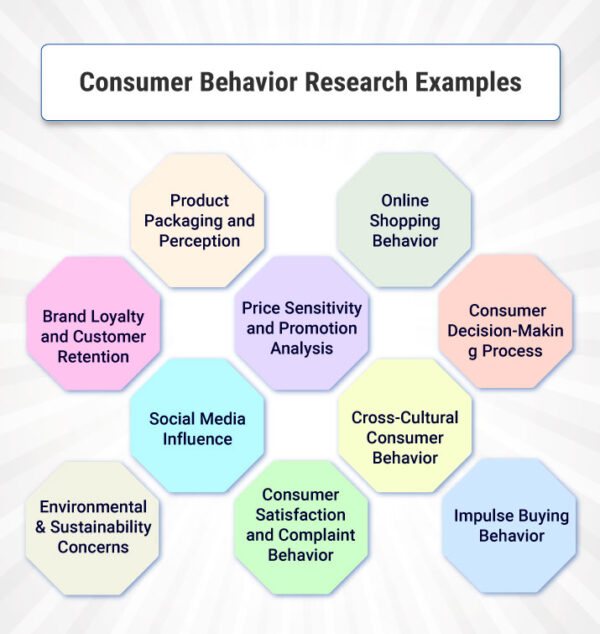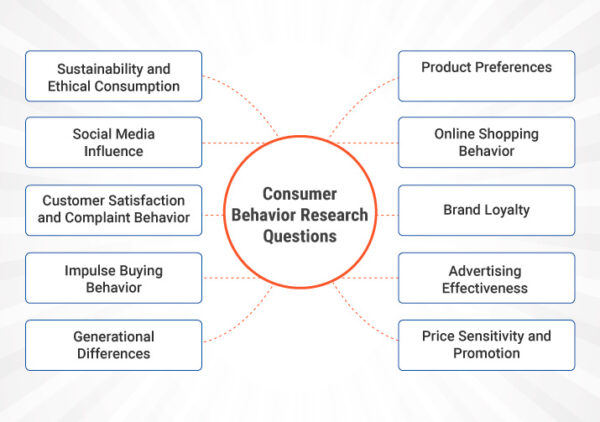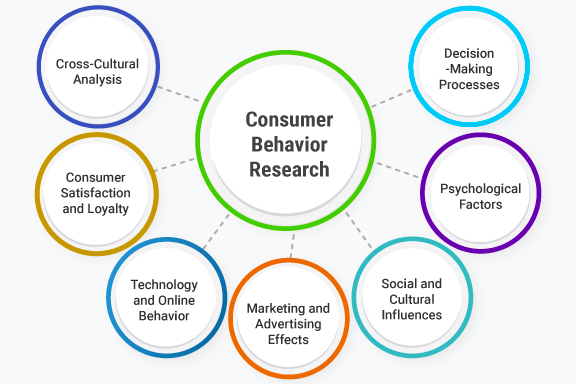What is Consumer Behavior Research?
Consumer behavior research is defined as a field of study that focuses on understanding how and why individuals and groups of people make decisions related to the acquisition, use, and disposal of goods, services, ideas, or experiences. This research seeks to uncover the underlying factors and processes that influence consumers’ choices, preferences, and behaviors in the marketplace.
Key aspects of consumer behavior research include:
- Decision-Making Processes: Researchers investigate the steps consumers take when making purchasing decisions. This involves studying how consumers identify needs, gather information, evaluate options, and ultimately make choices.
- Psychological Factors: Understanding the psychological aspects of consumer behavior is crucial. This includes exploring concepts such as motivation, perception, learning, memory, and attitudes to determine how they affect consumer choices.
- Social and Cultural Influences: Consumer behavior is heavily influenced by social and cultural factors. Researchers examine how social groups, family, friends, and cultural norms impact purchasing decisions.
- Economic Factors: Economic theories and models are used to analyze how factors like income, price sensitivity, and budget constraints affect consumer choices.
- Marketing and Advertising Effects: Researchers study the impact of marketing strategies, advertising campaigns, branding, and promotions on consumer behavior. This includes assessing the effectiveness of various marketing techniques.
- Technology and Online Behavior: With the rise of e-commerce and digital technologies, understanding how consumers behave in online environments has become increasingly important. Research in this area focuses on online shopping behavior, website usability, and the influence of online reviews and social media.
- Consumer Segmentation: Consumer behavior researchers often segment the market to identify different consumer groups based on demographics, psychographics, and behavioral patterns. This assists businesses in customizing their marketing strategies for particular target demographics.
- Consumer Satisfaction and Loyalty: Researchers study post-purchase behavior, including customer satisfaction and loyalty. They examine what factors lead to repeat purchases and brand loyalty.
- Ethical and Sustainable Consumption: In recent years, there has been a growing interest in understanding how ethical and sustainable considerations influence consumer choices. Researchers investigate the factors that drive environmentally conscious and socially responsible consumption.
- Cross-Cultural Analysis: Given the globalization of markets, understanding consumer behavior in different cultural contexts is vital. Researchers analyze how cultural values and norms impact consumer preferences and decision-making.
Consumer behavior research is essential for businesses and marketers to develop effective marketing strategies, product design, pricing strategies, and customer experiences that resonate with their target audience. By gaining insights into consumer behavior, companies can better meet consumer needs and achieve their business objectives.
Top 12 Consumer Behavior Research Examples

Consumer behavior research encompasses a wide range of topics and methodologies. Here are some examples of consumer behavior research studies and topics:
1. Product Packaging and Perception
Researchers might conduct studies to understand how the design and aesthetics of product packaging influence consumers’ perceptions and purchase decisions. For example, a study could examine how color, shape, and labeling affect consumers’ perceptions of a product’s quality and value.
2. Online Shopping Behavior
With the growth of e-commerce, research often explores various aspects of online shopping behavior. This can include studies on factors influencing shopping cart abandonment, the impact of website design on user experience, or the role of online reviews and ratings in purchase decisions.
3. Brand Loyalty and Customer Retention
Companies often conduct research to understand what factors contribute to brand loyalty and customer retention. This might involve surveys, customer feedback analysis, or loyalty program effectiveness studies.
4. Advertising Effectiveness
Researchers study how different types of advertisements, such as TV commercials, online banner ads, or influencer marketing, influence consumer attitudes and buying behavior. They may use techniques like eye-tracking to assess where consumers focus their attention in advertisements.
5. Price Sensitivity and Promotion Analysis
Research in this area aims to determine how consumers respond to pricing strategies, discounts, and promotions. It might involve experiments to assess the impact of price changes on sales or consumer surveys about their price sensitivity.
6. Consumer Decision-Making Process
Studies on consumer decision-making delve into the steps consumers take when making purchasing decisions. Researchers might use qualitative methods like in-depth interviews to understand the thought processes behind consumer choices.
7. Social Media Influence
Given the prevalence of social media in consumers’ lives, researchers examine how social platforms like Instagram, Facebook, and TikTok influence consumer behavior. They may investigate the role of social media in product discovery, brand engagement, and purchasing decisions.
8. Cross-Cultural Consumer Behavior
Research in this area explores how cultural differences affect consumer preferences and behaviors. For example, a study might investigate how cultural values impact the perception of luxury brands or the acceptance of certain products.
9. Environmental and Sustainability Concerns
Researchers study how consumers’ environmental and sustainability values impact their purchasing decisions. This can include surveys to understand the willingness to pay more for eco-friendly products or the influence of eco-labels.
10. Consumer Satisfaction and Complaint Behavior
Companies often conduct research to assess customer satisfaction and understand how customers express dissatisfaction or complaints. This research can help improve customer service and product quality.
11. Impulse Buying Behavior
Some studies focus on the triggers and factors behind impulse buying, such as point-of-sale displays, limited-time offers, or product placement in stores.
12. Neuromarketing
This emerging field uses neuroscience techniques, such as brain imaging and eye-tracking, to study consumer responses to marketing stimuli, providing insights into subconscious reactions to advertisements and product design.
These are just a few examples of the diverse range of consumer behavior research topics. Researchers employ various research methods, including surveys, experiments, observational studies, and data analysis, to gain insights into consumer behavior and inform marketing strategies and business decisions.
Learn more: What is Consumer Research?
Consumer Behavior Research Methods
Consumer behavior research employs various methods and techniques to understand and analyze how consumers make decisions, form preferences, and behave in the marketplace. These methods help researchers gather data and insights that can be used to inform marketing strategies, product development, and business decisions. Here are some common consumer behavior research methods:
- Surveys and Questionnaires: Surveys are a popular method for collecting data on consumer preferences, attitudes, and behaviors. Researchers design structured questionnaires and distribute them to a sample of respondents, either in person, by mail, over the phone, or online. Survey responses are analyzed to identify trends and patterns.
- Observational Research: Observational research involves the systematic observation of consumer behavior in natural or controlled settings. Researchers may use techniques like video recording, field notes, or mystery shopping to observe how consumers interact with products, make purchase decisions, or navigate retail environments.
- Experiments: Experimental research allows researchers to manipulate variables and observe their effects on consumer behavior. Controlled experiments often take place in a lab setting, while field experiments occur in real-world contexts. Researchers can study the impact of factors like pricing changes, advertising messages, or product variations.
- Focus Groups: Focus groups involve gathering a small group of participants to engage in discussions about specific topics or products. These discussions are typically guided by a moderator who asks questions and facilitates conversation. Focus groups provide qualitative insights into consumer perceptions and opinions.
- In-Depth Interviews: Researchers conduct one-on-one interviews with consumers to gain a deeper understanding of their thoughts, motivations, and decision-making processes. In-depth interviews are flexible and allow researchers to probe into specific areas of interest.
- Ethnographic Research: Ethnography involves immersing researchers in the lives of consumers and studying their behavior within their natural environments. This method is particularly useful for gaining insights into culture, lifestyle, and the context of consumer decisions.
- Online Behavior Analysis: With the growth of e-commerce and digital marketing, researchers can collect data on consumer behavior from online sources. This includes analyzing website traffic, click-through rates, online reviews, and social media interactions to understand how consumers engage with brands and products online.
- Neuroscience and Eye-Tracking: Neuroscience techniques, such as functional magnetic resonance imaging (fMRI), electroencephalography (EEG), and eye-tracking, can be used to study consumers’ neurological responses and eye movements when exposed to marketing stimuli, providing insights into subconscious reactions.
- Secondary Data Analysis: Researchers can analyze existing data sources, such as market reports, government statistics, and customer databases, to extract insights about consumer behavior. This method is cost-effective and often used for trend analysis.
- Big Data Analytics: Companies can leverage big data analytics to analyze vast amounts of data collected from online interactions, transactions, and social media to identify consumer patterns and trends.
- Psychological Experiments: Researchers may use psychological experiments to study cognitive processes, decision-making heuristics, and biases that influence consumer behavior. This can involve experiments on memory, perception, and motivation.
- Longitudinal Studies: Longitudinal studies involve tracking the same group of consumers over an extended period to understand how their behavior, preferences, and attitudes change over time.
The choice of research method depends on the research objectives, available resources, and the specific aspects of consumer behavior being studied. Often, a combination of methods is used to obtain a comprehensive understanding of consumer behavior.
Learn more: What is Customer Research?
12 Consumer Behavior Research Questions

Consumer behavior research often begins with the formulation of research questions that guide the study and help researchers explore specific aspects of consumer behavior. The choice of research questions depends on the goals of the study and the areas of interest. Here are some examples of consumer behavior research questions across various domains:
1. Product Preferences
- What factors influence consumers’ preferences for eco-friendly products?
- How do consumers prioritize price versus quality when choosing products in a competitive market?
2. Online Shopping Behavior
- What are the key factors that influence consumers’ decisions to abandon their online shopping carts?
- How do the design and layout of an e-commerce website affect user engagement and conversion rates?
3. Brand Loyalty
- What strategies can companies use to build and maintain brand loyalty among their customers?
- How does consumers’ emotional attachment to a brand impact their purchasing decisions?
4. Advertising Effectiveness
- How do different advertising channels (e.g., TV, social media, email) impact consumer brand recall and purchase intent?
- What role do emotions play in consumer responses to advertising messages?
5. Price Sensitivity and Promotion
- How do consumers respond to dynamic pricing strategies in the airline industry?
- What types of promotions are most effective in influencing consumer behavior during holiday shopping seasons?
6. Cross-Cultural Consumer Behavior
- How do cultural differences in communication styles impact consumer reactions to advertising campaigns?
- What cultural factors affect consumers’ perceptions of luxury brands in different regions?
7. Sustainability and Ethical Consumption
- What motivates consumers to make sustainable and eco-friendly choices in their purchasing behavior?
- How does transparency in product sourcing and manufacturing impact consumers’ trust and willingness to buy?
8. Social Media Influence
- To what extent does social media content, such as influencer endorsements and user-generated content, influence consumer purchasing decisions?
- How do different social media platforms impact the discovery and evaluation of products and services?
9. Customer Satisfaction and Complaint Behavior
- What factors contribute to customer satisfaction and loyalty in the hospitality industry?
- How do consumers express their dissatisfaction with products or services, and how can companies effectively address these concerns?
10. Impulse Buying Behavior
- What situational factors trigger impulse purchases in physical retail stores?
- How do limited-time offers and flash sales influence online impulse buying?
11. Neuromarketing Insights
- What brain regions are activated when consumers view emotionally appealing advertisements?
- How does the placement of key visual elements in advertisements affect consumer attention and recall?
12. Generational Differences
- How do the shopping behaviors and preferences of Generation Z differ from those of Millennials?
- What marketing strategies are effective in targeting Baby Boomers for luxury products?
These research questions provide a starting point for investigating various aspects of consumer behavior. Researchers can tailor their inquiries to specific industries, products, or market segments to gain valuable insights into consumer decision-making processes and preferences.
Learn more: What is Customer Feedback Analysis?
Most Recent Blogs
Explore the latest innovation insights and trends with our recent blog posts.










